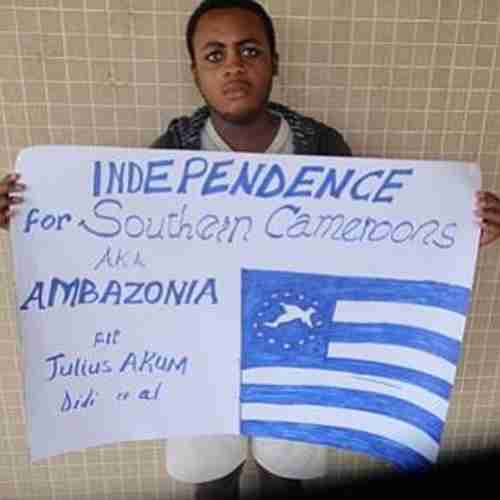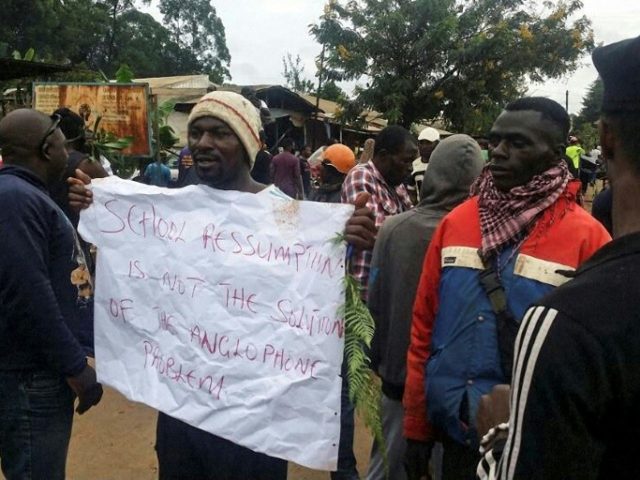This morning’s key headlines from GenerationalDynamics.com
- Cameroon condemns scathing Amnesty report on government atrocities
- Amnesty report documents increasing violence on both sides
Cameroon condemns scathing Amnesty report on government atrocities

Cameroon Anglophone separatist
Cameroon’s public relations (communications) minister Issa Tchiroma Bakary is condemning as “crude lies” an Amnesty International report accusing government security forces of summary killings, arrests and property destruction that amounts to ethnic cleansing.
The atrocities described in the report began in November 2016, when the Francophone (French-speaking) Cameroon government security forces began beating and killing peaceful anti-government demonstrators in the South Cameroons, the Anglophone (English-speaking) regions of Cameroon. The demonstrators were protesting systematic bias, discrimination, and marginalization towards Anglophones by the Francophone government. For example, schoolteachers in the Anglophone regions were forbidden from teaching any courses in English.
The Cameroon government, led by the 85-year-old president Paul Biya, has stepped up the torture, slaughter, and other atrocities continually since then, with numerous videos and reports on social media documenting the atrocities. The level of atrocities ticked up considerably in October, when the Anglophone separatists demanded independence for the Southern Cameroons, calling it Ambazonia. This week, there has emerged a new video purporting to show Francophone soldiers forcing Anglophone teenage girls to crawl through mud in front of the Cameroon Protestant College, as the men jeer at the girls and refer to them as Ambazonians.
Last month when Peter Henry Barlerin, the U.S. ambassador to Cameroon, said that “there have been targeted killings, detentions without access to legal support, family, or the Red Cross, and burning and looting of villages,” Biya’s spokesman Issa Tchiroma Bakary, said, “We do not accept the infantilization of the Cameroonian nation.”
So after this week’s Amnesty International report, this same spokesman Bakary said:
[The report] is stuffed with crude lies, hasty deductions (and) slanderous, unacceptable maneuvering, which are part of a strategy of harassment and destabilization of our country in its fight against the terrorist threat.
That is how things are done these days. A country leader starts by massacring, raping, arresting, torturing, and slaughtering peaceful protesters of a particular class or ethnic group, and then when any one of them strikes back, then call them “terrorists” and perform genocide and ethnic cleansing on the whole groups. That is what Bashar al-Assad has been doing in Syria, and that is what Burma’s leaders have been doing to the Rohingyas in Burma. If somebody complains, then the leader’s trolls say that “no evidence exists” of atrocities. AFP and Bareta News (includes video) and SCBC TV (Ambazonia)
Amnesty report documents increasing violence on both sides
There are increasing reports that the Anglophones are forming their own army called the Ambazonia Defense Forces, with about 1,500 people spread around 20 camps in the Anglophone regions. In most cases, the people are farmers who had been forced to leave their villages, armed with hunting rifles that are made in Nigeria.
The Amnesty report that the government calls “crude lies” is based on interviews with over 150 victims and eye-witnesses. The burning of villages and other ethnic cleansing activities can be seen in satellite images.
The report documents how Cameroon’s Francophone military responded to the Anglophone demonstrations:
Cameroon’s military has responded to these protests with arbitrary arrests, torture, unlawful killings and destruction of property. In one striking incident, satellite images and other photographic evidence obtained by Amnesty International show the complete destruction of the village of Kwakwa, which was burned to the ground by Cameroonian security forces following an operation conducted in December 2017 in connection with the killing of two gendarmes by suspected armed separatists.
In some cases, following these security operations, people were arbitrarily arrested and tortured while detained in illegal detention facilities and in secret. For instance, at least 23 people, including minors, were arrested by the security forces in the village of Dadi on 13 December 2017 and spent three days in incommunicado detention. They told Amnesty International that during this time security forces tortured them to extract “confessions”, to force them to admit having supported the separatists.
Victims described being blindfolded and severely beaten with various objects including sticks, ropes, wires and guns, as well as being electrocuted and burnt with hot water. Some were beaten until they lost consciousness, and Amnesty International documented that at least one person has died in custody.
Ambazonian separatists have been increasingly attacking Cameroon security personally. Between September 2017 and May 2018, at least 44 members of the security forces were killed in attacks at checkpoints, in the streets, or on their duty stations in the Anglophone region.
Towards the end of 2017, the situation quickly deteriorated. In October, demonstrations organized across the Anglophone regions to celebrate the symbolic independence from the country’s French-speaking areas were met with unlawful and excessive and deadly force. Cameroonian security forces shot dead 20 peaceful protesters, by firing indiscriminately on crowds, including from helicopters. Dozens of wounded protesters ran away from hospitals in mid-treatment out of fear of being arrested. Hundreds were arrested, and thousands fled their homes, becoming internally displaced or refugees in Nigeria.
…
Armed separatists have attacked security forces, especially gendarmes and police, killing at least 44 of them between September 2017 and May 2018, in both the North West and South West regions. In one of the most recent attacks, on 1 February 2018, in the locality of Mbingo, in the North West region, two gendarmes manning a checkpoint were stabbed to death by a group of young armed separatists.
Ordinary people have been targeted too. Teachers and students accused of not participating in the boycott have been physically assaulted, and at least 42 schools have been attacked by armed separatists from February 2017 to May 2018 in both the North West and South West regions.
…
In addition, armed separatists have attacked ordinary people – including traditional chiefs – perceived as being informants of the Cameroonian security forces.
Cameroon’s last generational crisis war was the “UPC Revolt,” 1956-1960, which was a bloody civil war by communists attacking the French government in the Cameroun colony. The outcome was independence in 1961 when the British Cameroons colony and the French Cameroun colony were merged into a single country, and the Anglophones became a disadvantaged and marginalized minority. Today, the Anglophone regions are known as the “Southern Cameroons.”
From the point of view of Generational Dynamics, examination of hundreds of examples throughout history shows that 58 years after the end of a previous generational crisis war, the society or nation enters a generational Crisis era, and a new crisis war can begin and becomes increasingly likely in each year after that. 58 years is the length of time before the generations that survived the previous crisis war and have personal memories of its atrocities disappear, either retiring or dying. After that, the younger generations are completely in control and have no fear of another war.
The year 2018 is exactly 58 years after the end of the “UPC Revolt” civil war. That does not mean that a new civil war will begin this year, but it does not mean that the probability of a new civil war is significantly higher than it was last year. The events in Cameroon in the last nine months show that Cameroon is certainly headed in that direction. Amnesty International and Radio France International
Related Articles
- Dozens killed in English-speaking Cameroon region by French-speaking government police (28-May-2018)
- Nigeria threatens Cameroon as 40,000 refugees cross the border (08-Feb-2018)
- Cameroon Catholic Church splits over government ‘barbarism’ and ‘growing genocide’ (15-Jan-2018)
- Cameroon’s army to force English-speaking children to attend school (31-Aug-2017)
- Brief generational history of Cameroon (15-Feb-2017)
- War becomes more likely as Mali enters a generational Crisis era (27-Jan-2018)
KEYS: Generational Dynamics, Cameroon, Southern Cameroons, Anglophones, Francophones, Paul Biya, Amnesty International, Cameroon Protestant College, Ambazonia, Liberation Movement of Southern Cameroons, Peter Henry Barlerin, Issa Tchiroma Bakary
Permanent web link to this article
Receive daily World View columns by e-mail

COMMENTS
Please let us know if you're having issues with commenting.